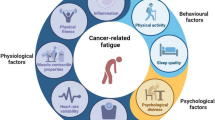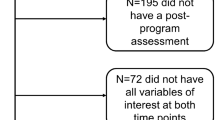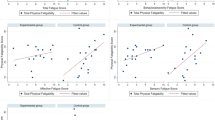Abstract
Purpose
Patients suffering from postcancer fatigue have both an inferior physical activity and physical fitness compared to non-fatigued cancer survivors. The aims of this study were (1) to examine the effect of cognitive behavior therapy, an effective treatment for postcancer fatigue, on physical activity and physical fitness and (2) to examine whether the effect of cognitive behavior therapy on postcancer fatigue is mediated by physical activity and/or physical fitness.
Methods
Severely fatigued cancer survivors were randomly assigned to either the intervention (cognitive behavior therapy) or the waiting list condition. After assigning 23 patients in the intervention condition and 14 patients in the waiting list condition, they were assessed both at baseline and 6 months later. Physical activity was assessed via actigraphy and physical fitness was assessed by a maximal exercise test. A nonparametric bootstrap approach was used to test the statistical significance of the mediation effects.
Results
A significant increase in physical activity was observed in the intervention group from baseline to follow-up, whereas physical activity did not change from baseline to follow-up in the waiting list group. Physical fitness did not significantly change after cognitive behavior therapy or after 6 months of waiting for therapy. Fatigue decreased more significantly in the intervention group than in the waiting list group. The mediation hypotheses were rejected.
Conclusions
Cognitive behavior therapy effectively reduced postcancer fatigue and increased physical activity but did not change physical fitness. The effect of cognitive behavior therapy on postcancer fatigue is not mediated by a change in physical activity or physical fitness.


Similar content being viewed by others
References
Baron RM, Kenny DA (1986) The moderator-mediator variable distinction in social psychological research: conceptual, strategic, and statistical considerations. J Personal Soc Psychol 51:1173–1182
Bartsch HH, Weis J, Moser MT (2003) Cancer-related fatigue in patients attending oncological rehabilitation programs: prevalence, patterns, and predictors. Onkologie 26:51–57
Bergner M, Bobbitt RA, Carter WB, Gilson BS (1981) The sickness impact profile: development and final revision of a health status measure. Medical care 19:787–805
Bower JE, Ganz PA, Desmond KA, Bernaards C, Rowland JH, Meyerowitz BE, Belin TR (2006) Fatigue in long-term breast carcinoma survivors: a longitudinal investigation. Cancer 106:751–758
Bower JE, Ganz PA, Desmond KA, Rowland JH, Meyerowitz BE, Belin TR (2000) Fatigue in breast cancer survivors: occurrence, correlates, and impact on quality of life. J Clin Oncol 18:743–753
Cramp F, Daniel J (2008) Exercise for the management of cancer-related fatigue in adults. Cochrane Database Syst Rev. doi:10.1002/14651858.CD006145.pub2
Dimeo F, Schmittel A, Fietz T, Schwartz S, Kohler P, Boning D, Thiel E (2004) Physical performance, depression, immune status, and fatigue in patients with hematological malignancies after treatment. Ann Oncol 15:1237–1242
Dittner AJ, Wessely SC, Brown RG (2004) The assessment of fatigue: a practical guide for clinicians and researchers. J Psychosom Res 56:157–170
Fong DY, Ho JW, Hui BP, Lee AM, Macfarlane DJ, Leung SS, Cerin E, Chan WY, Leung IP, Lam SH, Taylor AJ, Cheng KK (2012) Physical activity for cancer survivors: meta-analysis of randomised controlled trials. BMJ 344:e70
Galvao DA, Newton RU (2005) Review of exercise intervention studies in cancer patients. J Clin Oncol 23:899–909
Gielissen MF, Schattenberg AV, Verhagen CA, Rinkes MJ, Bremmers ME, Bleijenberg G (2007) Experience of severe fatigue in long-term survivors of stem cell transplantation. Bone Marrow Transplant 39:595–603
Gielissen MF, Verhagen CA, Bleijenberg G (2007) Cognitive behaviour therapy for fatigued cancer survivors: long-term follow-up. Br J Cancer 97:612–618
Gielissen MF, Verhagen S, Witjes F, Bleijenberg G (2006) Effects of cognitive behavior therapy in severely fatigued disease-free cancer patients compared with patients waiting for cognitive behavior therapy: a randomized controlled trial. J Clin Oncol 24:4882–4887
Gielissen MF, Wiborg JF, Verhagen CA, Knoop H, Bleijenberg G (2012) Examining the role of physical activity in reducing postcancer fatigue. Support Care Cancer 20:1441–1447
Hjermstad MJ, Fossa SD, Oldervoll L, Holte H, Jacobsen AB, Loge JH (2005) Fatigue in long-term Hodgkin’s disease survivors: a follow-up study. J Clin Oncol 23:6587–6595
Jacobsen PB, Donovan KA, Vadaparampil ST, Small BJ (2007) Systematic review and meta-analysis of psychological and activity-based interventions for cancer-related fatigue health psychology. official journal of the Division of Health Psychology American Psychological Association 26:660–667
McNeely ML, Campbell KL, Rowe BH, Klassen TP, Mackey JR, Courneya KS (2006) Effects of exercise on breast cancer patients and survivors: a systematic review and meta-analysis. CMAJ 175:34–41
Moss-Morris R, Sharon C, Tobin R, Baldi JC (2005) A randomized controlled graded exercise trial for chronic fatigue syndrome: outcomes and mechanisms of change. J Heal Psychol 10:245–259
Nieboer P, Buijs C, Rodenhuis S, Seynaeve C, Beex LV, van der Wall E, Richel DJ, Nooij MA, Voest EE, Hupperets P, Mulder NH, van der Graaf WT, TenVergert EM, van Tinteren H, de Vries EG (2005) Fatigue and relating factors in high-risk breast cancer patients treated with adjuvant standard or high-dose chemotherapy: a longitudinal study. J Clin Oncol 23:8296–8304
Okuyama T, Akechi T, Kugaya A, Okamura H, Shima Y, Maruguchi M, Hosaka T, Uchitomi Y (2000) Development and validation of the cancer fatigue scale: a brief, three-dimensional, self-rating scale for assessment of fatigue in cancer patients. J Pain Symptom Manage 19:5–14
Preacher KJ, Hayes AF (2004) SPSS and SAS procedures for estimating indirect effects in simple mediation models behavior research methods, instruments, and computers. a journal of the Psychonomic SocietyInc 36:717–731
Prins JB, Bleijenberg G, Bazelmans E, Elving LD, de Boo TM, Severens JL, van der Wilt GJ, Spinhoven P, van der Meer JW (2001) Cognitive behaviour therapy for chronic fatigue syndrome: a multicentre randomised controlled trial. Lancet 357:841–847
Prinsen H, Bleijenberg G, Zwarts MJ, Hopman MT, Heerschap A, van Laarhoven HW (2012) Physiological and neurophysiological determinants of postcancer fatigue: design of a randomized controlled trial. BMC cancer 12:256
Prinsen H, Hopman MT, Zwarts MJ, Leer JW, Heerschap A, Bleijenberg G, van Laarhoven HW (2013) Maximal exercise performance in patients with postcancer fatigue. Support Care Cancer 21:439–447. doi:10.1007/s00520-012-1531-7, Epub 2012 Jul 14
Schmitz KH, Holtzman J, Courneya KS, Masse LC, Duval S, Kane R (2005) Controlled physical activity trials in cancer survivors: a systematic review and meta-analysis. Cancer Epidemiol Biomarkers Prev 14:1588–1595
Servaes P, Gielissen MF, Verhagen S, Bleijenberg G (2007) The course of severe fatigue in disease-free breast cancer patients: a longitudinal study. Psychooncology 16:787–795
Servaes P, van der Werf S, Prins J, Verhagen S, Bleijenberg G (2001) Fatigue in disease-free cancer patients compared with fatigue in patients with chronic fatigue syndrome. Support Care Cancer 9:11–17
Servaes P, Verhagen C, Bleijenberg G (2002) Fatigue in cancer patients during and after treatment: prevalence, correlates, and interventions. Eur J Cancer 38:27–43
Servaes P, Verhagen S, Bleijenberg G (2002) Determinants of chronic fatigue in disease-free breast cancer patients: a cross-sectional study. Ann Oncol 13:589–598
Servaes P, Verhagen S, Schreuder HW, Veth RP, Bleijenberg G (2003) Fatigue after treatment for malignant and benign bone and soft tissue tumors. J Pain Symptom Manage 26:1113–1122
Smets EM, Visser MR, Willems-Groot AF, Garssen B, Schuster-Uitterhoeve AL, de Haes JC (1998) Fatigue and radiotherapy: (B) experience in patients 9 months following treatment. Br J Cancer 78:907–912
Speck RM, Courneya KS, Masse LC, Duval S, Schmitz KH (2010) An update of controlled physical activity trials in cancer survivors: a systematic review and meta-analysis. Journal of cancer survivorship: research and practice 4:87–100
Taylor HL, Buskirk E, Henschel A (1955) Maximal oxygen intake as an objective measure of cardio-respiratory performance. J Appl Physiol 8:73–80
van der Werf SP, Prins JB, Vercoulen JH, van der Meer JW, Bleijenberg G (2000) Identifying physical activity patterns in chronic fatigue syndrome using actigraphic assessment. J Psychosom Res 49:373–379
Vercoulen JH, Bazelmans E, Swanink CM, Fennis JF, Galama JM, Jongen PJ, Hommes O, Van der Meer JW, Bleijenberg G (1997) Physical activity in chronic fatigue syndrome: assessment and its role in fatigue. J Psychiatr Res 31:661–673
Vercoulen JH, Swanink CM, Fennis JF, Galama JM, van der Meer JW, Bleijenberg G (1994) Dimensional assessment of chronic fatigue syndrome. J Psychosom Res 38:383–392
Woo B, Dibble SL, Piper BF, Keating SB, Weiss MC (1998) Differences in fatigue by treatment methods in women with breast cancer. Oncol Nurs Forum 25:915–920
Acknowledgments
We thank all patients for participating in this trial; all physicians for referring patients for cognitive behavior therapy; Lianne Vermeeren for assistance in data collection; José de la Fonteijne, Thea Berends, Hans Knoop, and Hein Voskamp for treating the patients with cognitive behavior therapy; and Bregina Hijmans-Kersten and Linda Pardoel for technical support and helpful advice during the maximal exercise tests. This work was supported by the Dutch Cancer Society [KUN 2008–4002], but it was not involved in the study design, collection, analysis, and interpretation of data; in the writing of the manuscript; and in the decision to submit the manuscript for publication.
Conflict of interest statement
The corresponding author and the co-authors have no conflicts of interest to declare.
Author information
Authors and Affiliations
Corresponding author
Rights and permissions
About this article
Cite this article
Prinsen, H., Bleijenberg, G., Heijmen, L. et al. The role of physical activity and physical fitness in postcancer fatigue: a randomized controlled trial. Support Care Cancer 21, 2279–2288 (2013). https://doi.org/10.1007/s00520-013-1784-9
Received:
Accepted:
Published:
Issue Date:
DOI: https://doi.org/10.1007/s00520-013-1784-9




